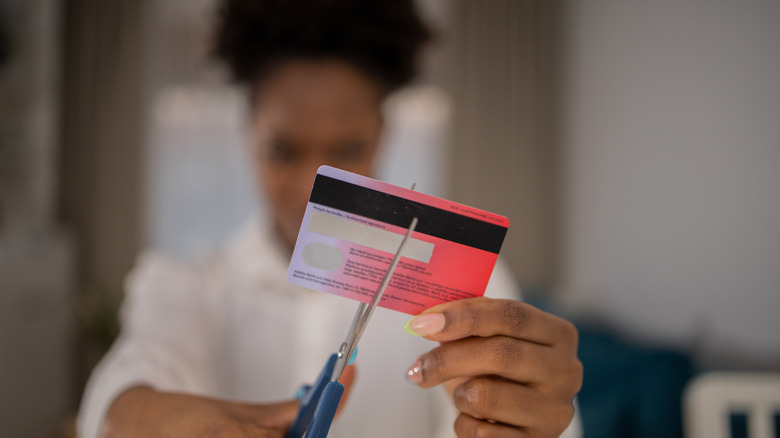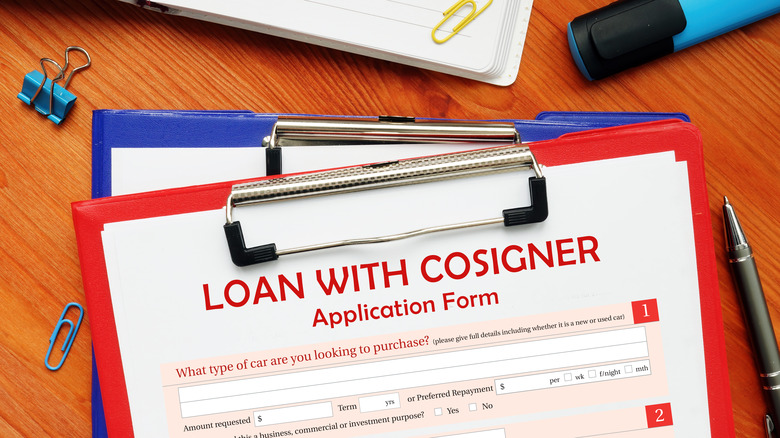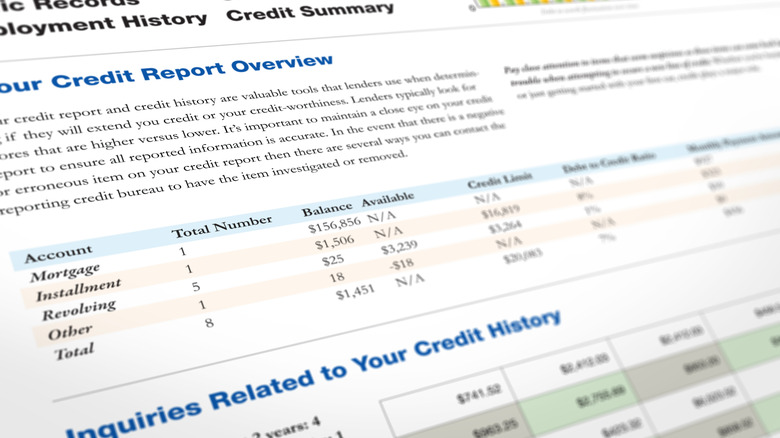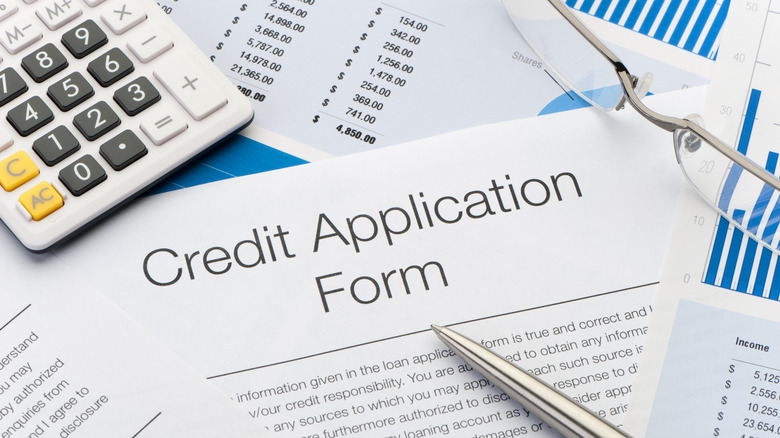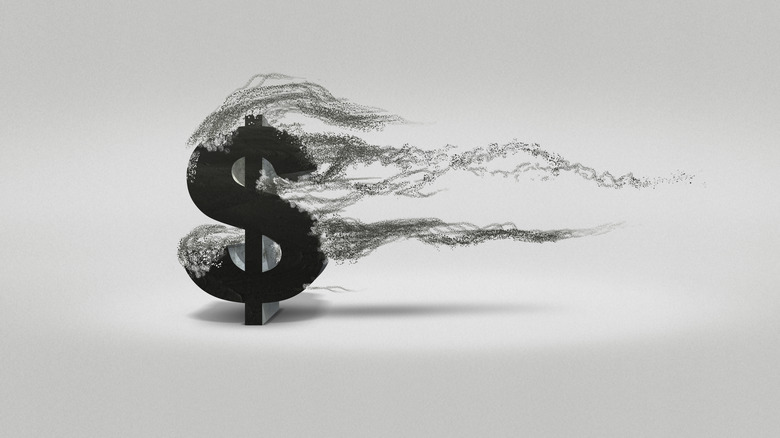11 Things That'll Tank Your Credit Score
Credit scores are a certainty in life. They are a mathematical representation of an individual's "creditworthiness." This concept loosely translates to a measure of how likely any particular borrower is to pay back their debts. FICO credit scores, the standard that nearly everyone will be familiar with, range from 300 to 850. For context, mortgage lending tends to rely on a score threshold of about 620, although terms for lending will be unique in every individual situation.
Most Americans understand the vagaries surrounding their credit score, as well as the importance of keeping it in good standing. Paying your bills on time (whether student loans, mortgage payments, or credit card statements) is a great place to start when working to improve your credit score. However, there are plenty of murky aspects to the math that goes into credit scoring. Your only experience with your credit score may be the small box that pops up at the bottom of your credit card app listing the number. That's entirely OK, but it is a good idea to familiarize yourself with some major features of money management that help determine your score. Those with scores in the "Good" band or better (generally around 700 or higher) can enjoy the best rates, most beneficial repayment terms, and even the potential for higher limits and borrowing sums. Successfully managing your credit is crucial to long-term financial health, and avoiding these pitfalls can make that an ingrained habit.
Missing payments
Obviously, missing a payment is detrimental to your efforts to create a good credit history. A missed payment, if left for long enough, will be reported to credit bureaus and linger over your future credit health. Missed payments are one of the most visible forms of breaking your agreement to repay a loan, and if you wait for more than a month to pay down an overdue bill, you could be looking at a drop in your credit score of as much as 100 points.
Not only does a late payment have the potential to knock a gigantic chunk out of your credit score, but late fees and other accumulated interest that's added onto your bill can result in an even deeper hole than the one you've already found yourself in (resulting in an inability to pay the bill on time). Missing payments should be avoided at all costs because of their potentially detrimental effect on your score and the knock-on consequences that follow.
Fortunately, a late payment made just a few days after it's due typically won't incur the same extreme wrath from your lender. Functionally, it takes effort from a lender to report a missed payment to credit bureaus, and so they won't generally initiate this reporting protocol immediately after a payment is officially late. However, if you're chronically late on your bills, you can't necessarily count on this quasi-grace period to remain in effect indefinitely.
Maintaining high revolving credit balances
Generally speaking, experts recommend utilizing no more than 30% of your available credit. This means that if you have one card with a $1,000 limit, don't spend more than $300 on it at any one time. Treating a 30% threshold as your limit is a good way to remain in good standing financially.
Sticking to this upper limit can help you maintain positive cash flow regularly and promote good spending habits that naturally prevent you from overindulging and spending more than you're earning. A high credit utilization figure suggests the opposite: If you're routinely finding your revolving balances much higher than this 30% figure, you are likely signaling to potential future lenders that you aren't entirely responsible with the credit you already have access to. Fortunately, transforming your relationship with credit cards and other lending products is simply a matter of perspective and willpower. Freezing your card in the app or taking it out of your wallet will help you spend only the money you have in your account (or the cash you have on hand). Reversing the relationship so that you're only paying down debts rather than creating new ones can quickly change this financial picture for the better. It's worth noting, however, that once you've reached 30% utilization, you shouldn't take your foot off the pedal; those enjoying the highest 25% of credit scores average a revolving balance utilization of just 7%.
Closing (the wrong) credit card accounts
Another factor that plays a crucial role in your credit history is longevity. There is a twofold approach to determining longevity in your credit scoring: Average age across all your credit accounts, and the age of your oldest lending product.
Your oldest card isn't likely to be your most trusted option. It might be a secured card, or just one that doesn't offer any cashback or points rewards. But closing out the oldest card in your wallet could mean slicing many years off the age of your oldest lending product as well as your average credit age, creating a total rebalancing of your credit score. Reducing the longevity of your lending history is a fast and incredibly easy way to crater your credit score, especially if there's a long gap between your first card and the next one you currently maintain. Your first card may have been opened when you were 18 and heading off to college, with subsequent accounts coming into the fold only after graduation. Protecting that history should be made a priority, even if you haven't used the card for quite some time.
Closing high limit accounts
In addition to the age of your credit history, closing credit accounts affects your score in another critical way. In the same realm of credit utilization that spending on your cards fits into, closing a credit card account also transforms your utilization ratio by eliminating available credit.
In another example, if you have four cards, each with a $2,500 limit, then your total credit line is $10,000. If you've spent $2,800 across three and have one balance totally clear, your utilization is 28%, just under the 30% threshold. However, by closing the card you aren't using, your total line of credit drops to $7,500, and your utilization rises to 37%, placing your credit usage firmly into unhealthy territory without making any new purchases. The lesson here is that credit management isn't just about spending and repayments. Maintaining your credit products with an eye on how they influence one another, and your score more generally is an important part of good financial stewardship. Fiscal intelligence involves the holistic process of spending and planning for the future, as a result, maintaining a good credit score requires you to strategize in more ways than just balance management.
Relying on too many balance transfers
A balance transfer can be an exceptional tool to help pay down high-interest lending products with less pain. Often, balance transfer offers will provide for zero or incredibly low-interest repayment periods that might last a year or longer. Paying the balance transfer fee (typically 3% to 5% of the sum transferred) is all you may be on the hook to add to the principal if you're diligent about eliminating the balance during the promotional period.
But, balance transfers often come with a hidden catch. To get the best possible terms, you may have to open a new account specifically to take advantage of a great balance transfer offer. Opening too many new accounts can throw your credit scoring balance out of whack, reducing it in the short term and keeping it chained down over a longer period. In addition, it's easy to get lazy about repayment on debt that carries a zero-interest offer. This is what credit card companies are counting on, and once the promotional period runs its course, any debt that hasn't been taken care of reverts to the standard rate—sometimes at an even higher interest figure than was on the original card. At this point, some users will start looking for a new balance transfer opportunity to gain another promotional interest period, tacking on another transfer fee, and starting the process over again. This cycle is where the most detrimental effects can be seen.
Applying for too many loans
When completing an application for a new loan or credit card account, the lender you're working with will perform a hard credit check on you. During the initial phases of the application they may do a soft pull of your credit — resulting in no change to your credit score — however, to finalize any new lending product, the hard check is inevitable. Credit inquiries will reduce your credit score in the short term, but this reduction tends to equalize after a few months of good credit management on the new account.
The reality, however, is that users statistically tend to become worse at managing older credit lines when they start to benefit from a newer one. This is perhaps the logic behind a credit inquiry's effect on your score. Where the real trouble lies is in routine hard inquiries. Of course, if you're shopping around for a mortgage, you are likely to have a few hard pulls within quick succession as you gather quotes. That's not a big deal, but constantly applying for new cards or personal loan products will put a severe weight on your credit score. Hard inquiries remain on your credit report for two years, so timing is everything when applying for a new line of credit or loan for a big purchase.
Cosigning on a friend or family member's credit application
When you cosign on an application for a friend or family member's borrowing needs, you lend your credit history to their attempt to secure funding. The functional result is that you act as a backer for them. Cosigners can help push an application over the hump if a little extra heft is needed to secure a mortgage or car loan. However, a cosigner becomes liable for the debt if the borrower defaults on their repayments. If you cosign an application, you become intimately linked to the other person's usage of the credit line or loan funding. You won't have any direct control over how they use the financial product, but the way they manage it will affect your credit as well as theirs.
If a borrower doesn't manage their credit line responsibly, it will begin to damage their credit score. As a cosigner, your score will be weighed down by this irresponsible usage as well. And a default on the loan means that you'll become entangled in strategies to repay the debt. The potential damage that cosigning on a loan application can bring means that this should only be considered in the most extreme of circumstances. For most consumers, this is an all-around bad idea, even if saying no will create tension within a family or friend group.
Failing to routinely check on your credit report
Consumers are increasingly at risk of becoming targets of identity thieves and other criminals who make use of financial data for their own enrichment. Scraps of information can be all a savvy crook needs to gain access to your credit accounts or perhaps even open a new line of credit in your name.
Naturally, upon successfully establishing a fraudulent credit account, thieves won't be too eager to begin paying back the loans. But this leaves victims on the hook for their purchases, and without knowledge of their existence, they can quickly become incredibly damaging to a target's credit score. If you know an account has been opened fraudulently, you can have it closed and remove any financial obligations relating to the activity, but you need to know it exists to take these steps. Nearly 390,000 reports of credit card fraud were lodged with the FTC in 2021, signaling the sheer volume of financial thieves in operation out there. Fortunately, checking your credit report is a simple and immensely effective way to combat fraudulent activity. You can request one per year for free from each of the three major credit bureaus, so getting a new one every four months will give you maximum coverage throughout the year. Not only does checking your credit report help stop fraud, but it can alert you to inaccuracies and old information that may also be limiting growth in your credit score.
Opening too many new credit accounts
New credit accounts statistically raise the likelihood that you'll fall behind on paying back existing debts. When you open a new account, even though it improves your credit utilization and available credit statistics, it reduces your credit score by a small percentage. This might be only a few points, but the more you open new accounts the more weight this part of the credit scoring takes on.
With a new account, you'll have an opportunity to create an improvement in your score, but lackadaisical management can result in a continuing drop instead. For instance, if you start spending on the new account to reach a bonus cashback or points offer, you might end up carrying new balances over after each month. The same can easily happen on cards that offer a zero-interest period directly after signup. This changes the balance of your utilization percentage and available credit negatively, creating a downward trend in your credit score to match.
Filing for bankruptcy
Bankruptcy decimates credit scores. This is a natural consequence of declaring formally that you can't and don't intend to pay back your existing debts. A bankruptcy filing acts as a gigantic black mark against your creditworthiness, just as you might expect. However, it is possible to come back from this act of last resort and rebuild your credit. For a highly motivated credit rebuilder, returning to a 700-range credit score after bankruptcy can be accomplished in four years if given the most advantageous circumstances. But for many, it will take longer.
This isn't to say that bankruptcy should be avoided by everyone, regardless of their situation. If you are truly unable to repay your debts, this is a relief step that can make for a brighter future. But it's a future that will be unaided by lending products for the foreseeable future. It's a sort of nuclear option for getting out from under a tremendous debt burden, with your creditworthiness taking the brunt of the devastation. Ironically though, some borrowers will see an increase in their credit score after completing a bankruptcy filing because it can clear away a vast history of negative factors, leaving just the bankruptcy action itself on your credit report.
Using a debt settlement company to minimize repayments
In the same drastic vein of bankruptcy action, debt settlement companies can act as a go-between to help wipe away titanic debts that you cannot get out from under. They are a positive force for a certain section of borrowers who have found themselves in way too deep and who require a dramatic step to help right their financial ship. But before enlisting a debt settlement company to help you restructure your credit card or personal loan debts, it's important to understand how they operate.
In no uncertain terms, a debt settlement approach that relies on a third-party negotiator results in true credit devastation. Still, for someone struggling this much with repayments, a good credit score isn't the primary concern. The way these companies accomplish debt restructuring is by directing your monthly payments to them, instead of your lenders. For six months, a year, or perhaps even longer, you'll pay into a cash reserve that will act as a repayment vehicle somewhere down the line. During this time, you won't be paying your lenders, and will therefore accrue numerous missed payments on your credit report. At the end of the settlement timeline, the company will offer a new payment structure, including the money you've paid into the settlement fund, to get some (or maybe even all) of your debt forgiven. This approach can help you get debt-free faster, but it will ruin your credit score in the process. This is a trade that shouldn't be made lightly but is a good option for some borrowers.



